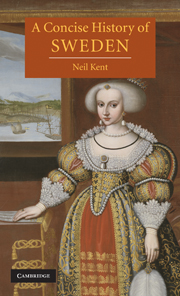Book contents
- Frontmatter
- Contents
- List of illustrations
- Maps
- Preface
- 1 From prehistory to Viking hegemony
- 2 The formation and growth of the Swedish state
- 3 The territorial consolidation of Sweden
- 4 Towards a centralist and military state
- 5 The collapse of absolutism and the Age of Freedom
- 6 Royal absolutism restored
- 7 Constitutional Sweden
- 8 The industrialisation and capitalisation of Sweden
- 9 The world wars and Swedish neutrality
- 10 Triumph of the Swedish welfare state
- Conclusion
- Appendix 1 Chronology
- Appendix 2 Monarchs and regents of Sweden
- Appendix 3 Prime ministers
- Selected further reading
- Index
7 - Constitutional Sweden
Published online by Cambridge University Press: 05 June 2014
- Frontmatter
- Contents
- List of illustrations
- Maps
- Preface
- 1 From prehistory to Viking hegemony
- 2 The formation and growth of the Swedish state
- 3 The territorial consolidation of Sweden
- 4 Towards a centralist and military state
- 5 The collapse of absolutism and the Age of Freedom
- 6 Royal absolutism restored
- 7 Constitutional Sweden
- 8 The industrialisation and capitalisation of Sweden
- 9 The world wars and Swedish neutrality
- 10 Triumph of the Swedish welfare state
- Conclusion
- Appendix 1 Chronology
- Appendix 2 Monarchs and regents of Sweden
- Appendix 3 Prime ministers
- Selected further reading
- Index
Summary
CONTINUED DISCONTENT WITH ROYAL ABSOLUTISM
During the decades which followed the assassination of Gustaf III, Sweden followed a path increasingly informed by consitutionalism. However, its journey on that path was extremely uneven. When Gustaf IV Adolph (1778–1837), still a child, succeeded to the throne, Sweden’s political future seemed highly volatile. Although the old king’s brother Duke Karl (1748–1818) became official regent, political power actually was vested in the hands of Baron Gustaf Adolph Reuterholm (1756–1813), a statesman who had been briefly imprisoned under Gustaf III because of political opposition, but was now supported by powerful allies. This took place against a backdrop of the French Revolution, which had led to a general military conflagration in Europe, a conflict in which Sweden was obliged to take a stand.
At first, the country was able to maintain its ‘armed neutrality’, in alliance with its erstwhile enemy Denmark. However, the flourishing trade that it was now enjoying led to confrontation with its old ally Great Britain, attempting to isolate and economically strangle France through a naval blockade. With the naval port of Karlskrona threatened by the British navy in 1801, Sweden relented. Yet an internal confrontation between Gustaf IV Adolph, a committed autocrat who, upon coming of age, had succeeded to the throne in 1796, and disgruntled members of the nobility, some of whom sympathised with revolutionary ideas, led to a conflict in government and international political repercussions which could not be easily resolved. The tumultuous Riksdag convoked at Norrköping in 1800 demonstrated to the king his lack of support. So he refused any further convocations, and hostility to his reign increased among wide segments of the population. With the king and the Riksdag in stalemate, the situation was aggravated further by the deterioration, once again, of relations with Russia. This had major consequences for Finland.
- Type
- Chapter
- Information
- A Concise History of Sweden , pp. 149 - 171Publisher: Cambridge University PressPrint publication year: 2008



